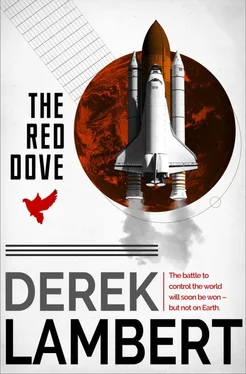After they had watched a game – football, baseball, basketball or whatever – they went back to Melnik’s apartment where, as often as not after a few drinks, the conversation extended to inequality in general, particularly in the global context.
But it was three months before Melnik suggested sex. And another week until Wonner agreed.
Six months to the day after their first meeting, Melnik suggested that Wonner might like to do something practical about their debates on global equality by helping to ensure that the super-powers enjoyed parity in space.
How? Why, pass over to the Soviet Union some of the US military space secrets, of course, because America was demonstrably ahead in its shuttle orbits, the key to the future.
Wonner realised immediately that this was so much shit; nevertheless he enjoyed the feeling of power he suddenly possessed, not to mention his relationship with Alex Melnik.
Perhaps one day, he reasoned with himself, he could do something that would really establish the balance of power in space instead of tilting it in favour of the Soviets.
None of which solved the immediate problem facing him as, after the last Tyuratam-Vandenberg link-up, he drove towards Los Angeles where he was supposed to meet Melnik at a bowling match.
He solved this problem by taking the Santa Barbara exit. It was, he realised, the most temporary of solutions. After being stood up Melnik would be after him with pleas, threats and blackmail.
Oddly, Wonner rather enjoyed anticipating such perils.
And anticipating the way in which he would deal with them.
In the light of the information received on the afternoon of 1 January from the American Embassy in Moscow the President of the United States introduced two members of his cabinet – the Secretary of State and the Defense Secretary – and the National Security Adviser into the Talin Conspiracy.
They met, with George Reynolds, at 6 p.m. in the Situation Room, the command post sunk beneath the West Wing of the White House. It was in this sombre, secret and economically-furnished chamber that, daily, a picture of global and spatial developments was composed.
The composition was made up from thousands of fragments. Photographs from spy satellites, electronic pulses from radar stations, observations from SR-71 Black Bird surveillance aircraft, digests from the world’s media, reports from embassies, consulates, intelligence agencies, spies…
As an aide had once vulgarly put it: ‘If a sparrow farted in Outer Mongolia its echo would reach the Situation Room.’
Earlier that day, long before the President had decided to spread the responsibility for Talin, the Situation Room had been electrified by another item of intelligence – blown-up surveillance photographs showing the deployment of CPBs, charged particle weapons, in the Soviet Union. It had been known that the Russians had built a CPB generator at Saryshagan on the Chinese border: it had not been known that they were in a position to deploy the generator’s products, far more deadly than lasers.
This disturbing information had been included in the black leather file containing the briefing that was presented to the President in the Oval Office at 9 a.m. every working day. Within fifteen minutes he had digested its contents.
The subsequent meeting in the Oval Office that morning had been dominated by the overnight appearance of the CPBs.
President: How far behind are we, Bill?
Defense Secretary William Fryberg: Not too far, Mr President.
President: How far’s not too far?
Defense Secretary (with shrug): Maybe six months. We’ve made good progress at the Los Alamos and Lawrence Liver-more labs recently. We may be behind now but when we produce the goods we should go ahead. You know, the Soviets always like to produce in haste and repent in leisure.
President: You should have been a lawyer, Bill. Maybe you’ll make Attorney-General yet. (Consulting chart showing deployment of CPBs.) Any idea where they’re aimed?
Defense Secretary: At us, I guess! And the Chinese, of course. And into space. As you can see they’ve moved them into their space centres. Into Tyuratam for instance.
President: Could they have shifted them into space itself?
Defense Secretary: Could be. They’ve sure as hell got lasers on their killersats. But, as you know Mr President, CPBs are way ahead of lasers: they don’t just melt a target’s armour, they sock right through it at the speed of light.
President: It makes neutron bombs seem like kids’ stuff.
But all that had been before the coded message marked URGENT from the US Embassy in Moscow that had prompted the five man emergency meeting in the Situation Room. It was brief and to the point:
Russia’s Dove shuttles are to be used to assemble an armada of gunships equipped with lasers and CPBs.
And if that wasn’t enough:
The Doves themselves are to be armed with conventional hydrogen bombs to be dropped on selected targets in the event of hostile action by the United States.
The source?
An informant.
At one minute past six the President began to address his four confidants – the Secretary of State, Joseph Craig, a bristling sixty-year-old former Army general; Defense Secretary Fryberg, slim and canny with his head cocked like a listening bird; Henry Fallon, the National Security Adviser, archetypal Washington, crisp but cautious; and Reynolds.
The President was backed by a chart showing the deployment of all known satellites orbiting the earth. The table at which the five men sat was flanked by steel filing cabinets. Security was maximum.
The three newcomers to the conspiracy had a ruffled, why-weren’t-we-consulted-earlier air about them; they directed their hostility towards Reynolds who fielded it adeptly – he had been in the field a long time.
The President, Reynolds thought, looked as crisp in a mature way as Fallon. White shirt with button-down collar, striped tie, dark suit, brown hair. Seventy-two, knocking on seventy-three… Jesus!
The President said: ‘I won’t attempt to conceal the fact that this was originally a two-man operation.’ Three sets of eyes focused on Reynolds. ‘Or that you have only been enrolled because of today’s developments.’
Craig began: ‘But why—’
‘Let me finish, Joe.’
Fryberg, Reynolds knew, was too canny to interrupt; where Fryberg led Fallon followed.
‘As George knows,’ the President went on, ‘this was to have been a spectacular aimed at upstaging the Soviets with the bonus that this man Talin would bring us a whole bundle of space secrets. But today the implications have become far graver and, at the same time, far more exciting.’
He glanced at his gold wristwatch; Reynolds knew why.
The President drank some water and continued: ‘We have today received conclusive proof that the Soviets have deployed CPBs. We have therefore got to speed up our own particle beam projects at Lawrence Livermore and Los Alamos.’
‘Project White Horse,’ Fryberg murmured.
‘And then we’ve got to persuade the world that we, as well as the Soviets, have to deploy them as a deterrent,’ emphasising the familiar last three words.
‘A whole lot of people,’ Craig said, ‘were unimpressed in 1981 when we tried to justify the deployment of Pershing II missiles by publicising the deployment of the Soviet SS-20s.’
The President swept on: ‘We have also received information from an unknown source that the Soviets plan to build gunships disguised as space stations in orbit.’
He paused and drank more water.
Fallon took the opportunity to point out: ‘There’s nothing new about that, Mr President. As you know, the Russians have been experimenting with laser weapons firing bullets of light from space stations for years.’
Читать дальше
Конец ознакомительного отрывка
Купить книгу












